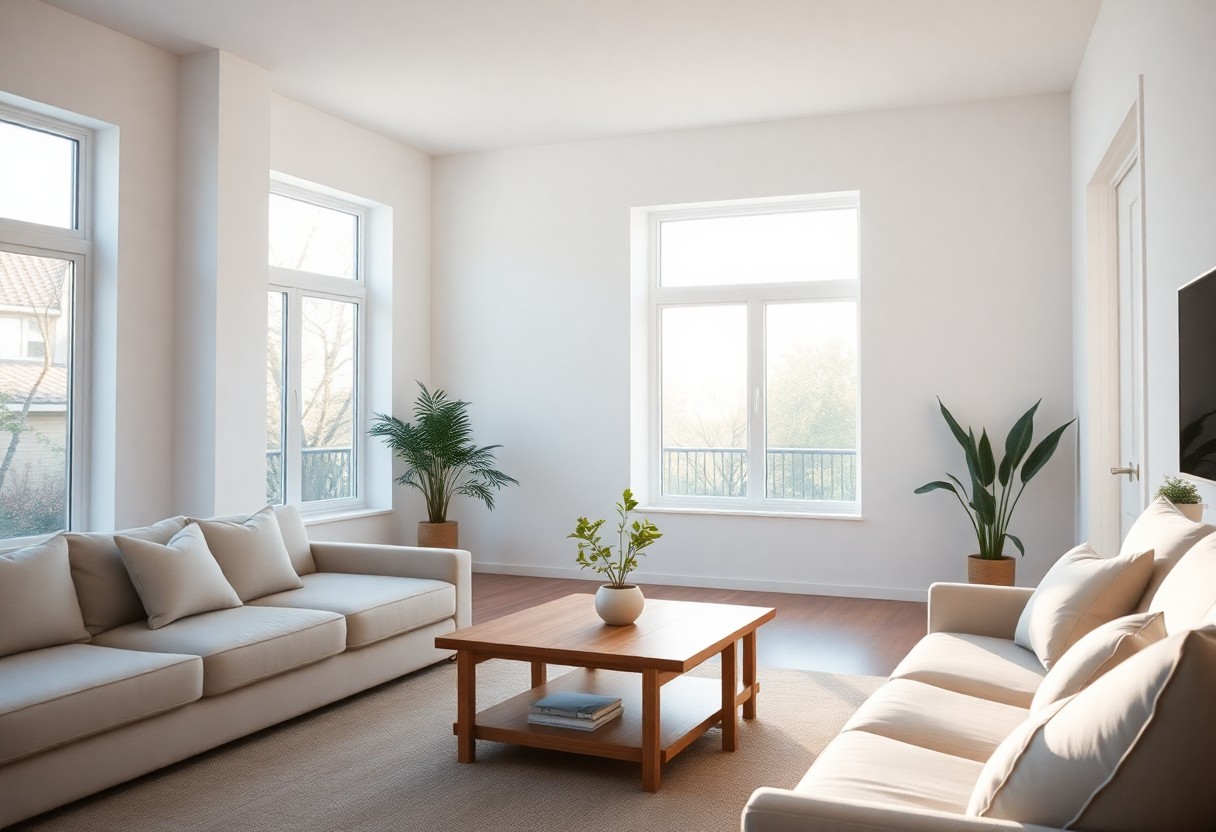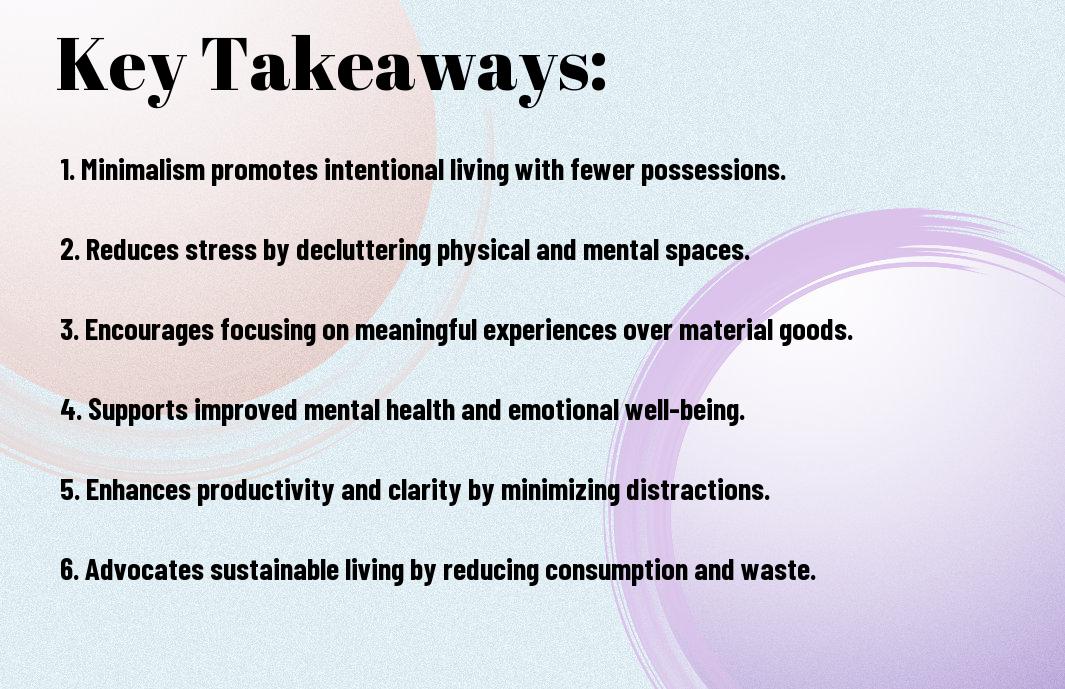Subscription required
Over recent years, you might have noticed the rise of minimalism as more than just a style—it’s a lifestyle embraced for its mental and physical health benefits. Health experts break down how reducing excess possessions and simplifying your environment can lead to lower stress levels, improved focus, and increased well-being. This comprehensive guide will help you understand how adopting minimalism can positively impact your health and daily routine by encouraging intentional living and mindfulness. By putting these insights into practice, you can cultivate a more balanced and fulfilling life.

Key Takeaways:
- The minimalism movement focuses on simplifying life by reducing physical and mental clutter, leading to improved mental health and decreased stress levels.
- Health experts highlight that minimalism can enhance overall well-being by promoting mindfulness, better sleep, and increased focus on meaningful activities.
- Adopting a minimalist lifestyle encourages intentional living, fostering stronger relationships and a more sustainable approach to consumption and resources.

Understanding Minimalism
Before you probe adopting minimalism, it’s important to grasp what this lifestyle truly entails. Minimalism is not about deprivation but about intentional living. By focusing on what truly adds value to your life, you can reduce clutter, stress, and distractions. Experts in health advocate minimalism because it promotes mental clarity and physical well-being, helping you prioritize your health and happiness through mindful choices.
Historical Context
On tracing back, minimalism originated as an art movement in the 1960s, emphasizing simplicity and clarity. Over time, it evolved beyond aesthetics into a broader lifestyle philosophy. Today, minimalism is embraced globally as a response to consumer culture and information overload, guiding you to create a balanced, purposeful life by consciously selecting what matters most.
Core Principles of Minimalism
Minimalism centers on intentionality, simplicity, and mindfulness in your daily decisions. It encourages you to declutter your environment and mind, focusing on what truly serves your well-being and goals. By aligning your possessions and habits with your values, you foster mental peace and enhanced productivity.
Historical roots of minimalism show its deep connection with philosophies like Zen Buddhism, which values simplicity and presence. Understanding these origins helps you appreciate minimalism as more than an aesthetic choice—it’s a holistic approach to living that nurtures your physical and emotional health, empowering you to lead a more meaningful and less distracted life.
Health Benefits of Minimalism
The health benefits of minimalism extend beyond just a tidy living space; they profoundly enhance your mental and physical wellness. By simplifying your environment and lifestyle, you reduce stress and anxiety, which in turn promotes clearer thinking and emotional balance. Minimalism encourages you to focus on what truly matters, leading to a more intentional and healthy life both mentally and physically.
Mental Health Improvements
The mental health improvements you experience from minimalism include reduced stress levels and increased clarity. By eliminating excessive clutter and distractions, your mind can rest more easily, which enhances focus and calmness. Adopting minimalism allows you to cultivate mindfulness and emotional resilience, helping you to manage anxiety and improve overall psychological well-being.
Physical Well-being Enhancements
Among the physical well-being enhancements, minimalism encourages healthier habits like better sleep and increased physical activity. A clutter-free environment lessens allergens and promotes hygiene, which contributes to improved respiratory health. You find it easier to maintain routines that support your body’s vitality, reinforcing an overall healthier lifestyle through simplicity.
Considering the physical benefits, minimalism often leads to a more active lifestyle because it frees up space and mental energy that you can invest in exercise and self-care routines. Your sleeping environment improves as clutter reduction makes your bedroom a more restful sanctuary. Additionally, the focus on fewer possessions helps prevent overconsumption, reducing exposure to harmful chemicals and promoting a cleaner living space. All of these factors combine to enhance your physical health and energy levels significantly.
Minimalism in Daily Life
Despite the modern culture of excess, adopting minimalism in your daily life can lead to greater clarity and peace of mind. Simplifying routines and possessions allows you to focus on what truly matters, enhancing your mental and physical well-being. By consciously choosing less clutter and distractions, you create space for mindfulness, reduce stress, and improve your overall quality of life.
Decluttering Techniques
Life feels lighter when you intentionally sort through your belongings and remove items that no longer serve you. Effective decluttering techniques involve setting specific goals, categorizing possessions, and evaluating their usefulness or emotional value. This systematic approach helps you maintain only what supports your lifestyle, making it easier to organize your environment and cultivate a sense of calm.
Mindful Consumption
Life changes when you become intentional about what you bring into your home and life. Mindful consumption encourages you to evaluate your needs versus wants, focusing on quality over quantity. This practice reduces waste and financial stress while allowing you to appreciate the value of each item or experience you choose.
In addition to reducing physical clutter, mindful consumption influences your habits and decisions beyond material goods. It encourages you to consider sustainability, ethical sourcing, and the long-term impact of your purchases. By aligning your consumption with your values, you foster a healthier relationship with possessions and the environment, reinforcing minimalism’s benefits on multiple levels.
The Role of Digital Minimalism
After embracing the minimalism movement, you often find your digital life requires attention to truly simplify. Digital minimalism helps you streamline your use of technology, reducing distractions and information overload. By focusing on intentional digital consumption, you can enhance your overall well-being and create space for meaningful offline experiences. This approach encourages you to prioritize digital tools and platforms that genuinely support your goals and values, fostering healthier tech habits and a balanced lifestyle.
Impact on Mental Clarity
Clarity in your mind improves significantly when you adopt digital minimalism. By limiting unnecessary notifications and reducing screen time, you lower cognitive overload and stress. This clearer mental space enables better focus, creativity, and emotional regulation, helping you navigate daily life with more calm and purpose. When you control your digital inputs, you allow your brain the rest it needs to function optimally and maintain mental resilience.
Strategies for Digital Detox
An effective digital detox involves setting boundaries that help you disconnect and recharge. You might schedule regular tech-free periods, uninstall non-vital apps, or use tools that monitor and limit your screen time. This intentional reduction in digital engagement gives you the opportunity to reconnect with yourself, your surroundings, and your relationships, fostering a healthier relationship with technology.
At the heart of implementing digital detox strategies is consistency. You can start small by designating certain hours as device-free, gradually increasing this over time. Cultivating alternative habits like reading, outdoor activities, or mindfulness practices fills the space previously occupied by digital distractions. Creating a personalized plan that aligns with your lifestyle reinforces your commitment and helps you maintain balance between digital engagement and real-world presence.
Minimalism and Sustainability
Many individuals find that adopting minimalism not only simplifies their lives but also contributes positively to the planet. By focusing on owning fewer, more meaningful possessions, you reduce waste and lessen the demand for mass-produced goods. This lifestyle encourages you to make thoughtful choices, aligning your consumption habits with sustainable values, ultimately supporting environmental preservation and responsible resource use.
Environmental Impact
Beside reducing clutter, minimalism significantly cuts down your carbon footprint. When you buy less and choose quality over quantity, you help decrease the production emissions, energy consumption, and waste generation typically associated with fast consumerism. This mindful approach to consumption supports natural ecosystems by minimizing pollution and conserving resources, contributing to a healthier planet for future generations.
Ethical Consumerism
Consumerism often promotes impulsive buying, but embracing minimalism invites you to prioritize ethical considerations in your purchases. You become more aware of the origins of products, favoring those made under fair labor conditions and with sustainable materials. This intentionality helps you support brands that align with your values, fostering better social and environmental practices worldwide.
Also, by practicing ethical consumerism within minimalism, you strengthen your role in a global shift toward responsible production and consumption. Choosing durable, ethically sourced items not only extends the lifespan of your belongings but also encourages companies to adopt transparent and sustainable methods, amplifying your positive impact beyond your personal lifestyle.
Overcoming Challenges in Adopting Minimalism
Once again, embracing minimalism introduces various challenges that might seem daunting at first. You may feel overwhelmed by the idea of letting go of possessions or question whether lifestyle changes fit your daily routine. Health experts suggest approaching these obstacles with patience and self-compassion, focusing on gradual progress rather than perfection. By adjusting your mindset and setting realistic goals, you can navigate these difficulties and fully experience the benefits minimalism offers for your physical and mental well-being.
Common Misconceptions
Against the belief that minimalism means living with almost nothing, many people misunderstand the movement. You don’t have to sacrifice comfort or style; minimalism is about intentional choices that enhance your life rather than limit it. Understanding this will help you avoid unnecessary guilt or frustration as you begin on your minimalist journey.
Practical Solutions
Around practical solutions, health experts recommend starting small by decluttering one area at a time and focusing on items that add value to your life. Developing daily habits that prioritize mindfulness and simplicity can make the process manageable and sustainable for you.
A practical approach includes creating specific goals for each space in your home, using methods like the KonMari technique or time-based decluttering to avoid feeling overwhelmed. You might find scheduling regular review sessions and celebrating small victories helpful, ensuring that minimalism becomes a positive and enduring part of your lifestyle.
To wrap up
Upon reflecting on the minimalism movement as explained by health experts, you can see how simplifying your environment and lifestyle positively impacts your mental and physical well-being. Embracing minimalism helps you reduce stress, increase focus, and create meaningful connections with what truly matters. By prioritizing quality over quantity, you empower yourself to lead a balanced and fulfilling life. Incorporating these insights allows you to make thoughtful choices that enhance your overall health and happiness.
FAQ
Q: What are the main health benefits of adopting a minimalist lifestyle according to health experts?
A: Health experts highlight several benefits of minimalism, including reduced stress and anxiety due to decluttering and simplifying one’s environment. By focusing on fewer possessions and commitments, individuals can experience improved mental clarity and enhanced emotional well-being. Additionally, minimalism often encourages healthier habits such as mindful consumption, better sleep patterns, and increased physical activity by prioritizing what truly matters in life.
Q: How does the minimalism movement impact physical health and daily routines?
A: The minimalism movement influences physical health by encouraging people to streamline their daily routines, which leads to more intentional choices around nutrition, exercise, and rest. Simplified living spaces can promote physical activity by creating more open and comfortable environments. Moreover, minimalism can reduce exposure to environmental toxins by limiting unnecessary consumer products, helping individuals maintain a cleaner and safer home environment.
Q: What practical steps do health experts recommend to begin embracing minimalism in everyday life?
A: Experts suggest starting with small, manageable changes such as decluttering a single room or area and evaluating possessions based on their usefulness and emotional value. They encourage adopting a mindset focused on quality over quantity when purchasing items, emphasizing experiences rather than material goods. Additionally, integrating mindfulness practices to enhance awareness of one’s habits, needs, and priorities can support a gradual and sustainable transition towards minimalism.





